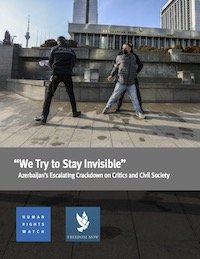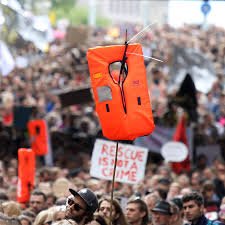By Jane Buchanan, Giorgi Gogia, and Arzu Geybulla.
The 74-page report, “‘We Try to Stay Invisible’: Azerbaijan's Escalating Crackdown on Critics and Civil Society,” documents the government’s concerted efforts to decimate civil society and silence its critics. The authorities have arrested dozens of people on politically motivated, bogus criminal charges. They have also arbitrarily enforced repressive laws that push independent groups and media to the margins of the law, heightening their vulnerability to retaliatory criminal prosecution. The groups documented 33 prominent cases of criminal prosecution, detention, and harassment. They found that Azerbaijani authorities have deliberately misused laws regulating nongovernmental organizations (NGOs) to deny certain groups registration and funding, exposing people affiliated with them to criminal charges. Azerbaijani authorities continue their assault on critics and dissenting voices. They use politically motivated criminal charges to prosecute and imprison human rights defenders, journalists, and civic and political activists, and arbitrarily enforce highly restrictive laws regulating non-governmental organizations (NGOs). The crackdown has intensified in the lead-up to the November 2024 UN Climate Conference (COP29) in Baku. Among those being prosecuted are veteran human rights defender Anar Mammadli, who co-founded a climate justice NGO, prominent anti-corruption activist and academic Gubad Ibadoghlu, and media professionals with the independent outlets Abzas Media and Toplum TV. Many independent groups have had to close, and activists have had to go into exile or continue their legitimate work on the margins of the law, at great personal risk. “We Try to Stay Invisible” is based on over 40 interviews with NGO leaders, lawyers, journalists, youth activists, and others, as well as in-depth analysis of laws and regulations used to target or constrain NGOs. The report documents the government’s concerted efforts to silence critical voices in the country. Human Rights Watch and Freedom Now call on the Azerbaijani government to immediately and unconditionally release those held on politically motivated charges, end the crackdown against civil society and independent media, and ensure that civil society groups and independent media can operate without undue hindrance before, during and after COP29. They should also amend repressive laws regulating NGOs. It calls on Azerbaijan’s international partners to set clear expectations for human rights improvements and impose concrete policy consequences should those requirements not be met.
New York: Human Rights Watch, 2024. 80p.




